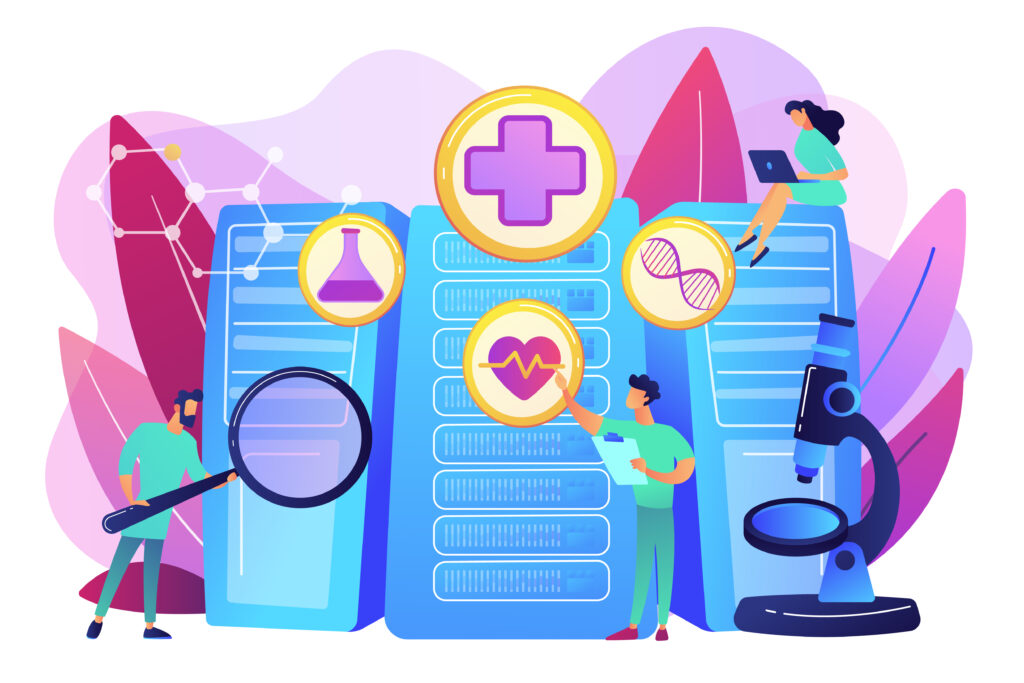As a healthcare professional, you understand the importance of using data to gain insights and drive better patient outcomes. With the increasing digitization of records and the proliferation of wearable devices and health apps, healthcare providers now have access to vast troves of data. While this ‘big data’ holds tremendous potential, the sheer volume and complexity can seem overwhelming. This article will explore practical strategies to harness big data’s power. By implementing advanced analytics, you can uncover patterns and derive actionable intelligence to provide more personalized, effective treatments. Big data also enables you to identify efficiencies, lower costs, and enhance service delivery. Equipped with the proper techniques, you can leverage big data to transform care quality. This article provides a roadmap to guide you in realizing big data’s promise for your patients and organization.
The Growing Role of Big Data in Healthcare
Improved Diagnostics and Personalized Treatment
Big data enables healthcare providers to analyze vast amounts of information to detect patterns and insights that can improve diagnostics and treatment. By combining data from medical records, genetic profiles, and wearable devices, doctors can develop personalized care plans tailored to each patient’s unique health needs.
Optimized Resource Allocation
Big data analytics help healthcare organizations optimize their resource allocation and reduce waste. Hospitals can better anticipate demand surges by analyzing historical data on patient admissions, length of stay, and staffing requirements and schedule staff accordingly. Analytics can also help identify wasteful spending by detecting unnecessary tests, procedures, or prescriptions.
Enhanced Patient Experience
When harnessed responsibly, big data leads to an enhanced patient experience. Predictive analytics allow providers to anticipate patients’ needs and personalize interactions. For example, AI chatbots can engage patients, answer health questions, and direct them to appropriate care options. Analytics also enable population health management by identifying at-risk groups and tailoring interventions.
While big data offers significant opportunities to improve health outcomes, lower costs, and enhance the patient experience, it also introduces risks that must be addressed, such as data privacy and security. Overall, big data will be instrumental in building a sustainable healthcare system that provides high-quality, affordable, and accessible care for all. However, we must ensure that it is implemented ethically and responsibly, keeping the well-being of patients and communities in mind.
How Big Data Is Improving Patient Outcomes

Detecting Health Issues Earlier
Big data analytics allow healthcare providers to detect potential health issues sooner by spotting patterns and correlations in large datasets. By analyzing factors like family history, lifestyle, and medical records, physicians can better predict risks and take a more proactive approach to patient care. Early detection of diseases like cancer, diabetes, and heart disease can significantly improve outcomes and even save lives.
Personalized Treatment Plans
Every patient is unique, so treatments and medications that work for some may not work for others. Big data helps doctors gain a more complete view of the patient, enabling customized treatment plans tailored to individual needs. By analyzing a patient’s genetic profile, health history, and other data, physicians can determine which treatments have the highest probability of success based on evidence from similar patients. Personalized medicine leads to faster recoveries, fewer side effects, and lower costs.
Optimizing Resource Allocation
Healthcare organizations can use big data analytics to maximize the utilization of resources like staff, facilities, and equipment. By analyzing historical usage patterns and projected demand, hospitals can optimize scheduling and staffing to reduce wait times, avoid service disruptions, and improve the patient experience. Big data also helps identify areas of waste and inefficiency, allowing healthcare providers to reallocate resources where they are needed most. Optimizing resources ultimately lowers costs while maintaining or even improving the quality of care.
Lower Costs
Big data analytics have significant potential to reduce healthcare costs over the long run. Detecting diseases earlier, providing personalized treatment, and optimizing resource allocation can all help lower costs for both patients and providers. In addition, big data can help identify which treatments and medications are the most cost-effective, enabling physicians to choose options that balance effectiveness and affordability. By leveraging data to gain insights into lowering costs while improving care, healthcare organizations can achieve the elusive “triple aim” of better health, better care, and lower costs.
Key Benefits of Leveraging Big Data Analytics
Improved Patient Care
Big data analytics allows healthcare providers to comprehensively understand patients and their health needs. By analyzing medical records, test results, and other data sources, providers can identify trends and patterns that enable personalized and pre-emptive patient treatment plans. For example, by analyzing historical data, physicians may determine that a patient is at high risk for a specific condition and can then recommend preventive action. Big data also facilitates coordinated care across providers by giving all patient care team members access to the same data.
Optimized Service Delivery
Healthcare organizations can use insights from big data analytics to improve operational efficiency and reduce costs. For instance, analytics may reveal unnecessary or redundant tests and procedures. It can also optimize staffing levels by forecasting patient volumes and needs. Analytics may identify wasteful or inefficient processes, allowing administrators to make targeted improvements. All of these optimizations serve to reduce healthcare costs and maximize the use of resources.
Enhanced Medical Research
Vast amounts of healthcare data provide fertile ground for medical research and discovery. By analyzing genetic data, family medical histories, treatment outcomes, and other information, researchers can better understand diseases and work to develop new treatments. Big data also enables precision medicine by allowing treatments tailored to individuals based on their unique biological makeup. In these ways, big data analytics has the potential to accelerate advances in healthcare and improve outcomes over the long term.
In summary, big data analytics significantly benefits healthcare providers and patients. It can achieve the “triple aim” of improved population health, enhanced patient experience, and reduced costs when leveraged effectively. While implementing big data solutions does present challenges, the potential rewards make it a goal worth pursuing for healthcare organizations.
Overcoming Challenges in Implementing Big Data
To fully harness the power of big data in healthcare, organizations must overcome several key challenges. Patient data is often stored in separate repositories that do not integrate well with each other. Breaking down these data silos is essential to gaining a comprehensive view of a patient and enabling predictive analytics. Healthcare organizations should invest in robust data warehouses and integration platforms that can pull data from multiple source systems.
Privacy and Security.
- With large amounts of sensitive patient data come significant privacy and security risks. Strict controls must be put in place to govern who can access data and for what purposes. Anonymization techniques can be used to protect patient privacy when data is used for analytics. Healthcare organizations must also employ strong security measures like encryption to protect against data breaches.
Data Quality.
- Poor data quality, such as missing, outdated, or incorrect data, severely limits the usefulness of big data analytics. Healthcare organizations must implement data governance programs to ensure high-quality, standardized data. Master data management helps create a “single source of truth” for critical data domains like patients, providers, and medications.
Skills and Expertise.
- Big data analytics requires specialized skills that many healthcare organizations currently lack. Data scientists, architects, and analysts must be recruited and retained. Existing staff should receive ongoing training and education on data analytics tools and techniques. Some organizations may benefit from partnerships with third-party analytics companies to supplement internal capabilities.
With investments in the right technologies, tools, and talent, healthcare organizations can overcome barriers to extensive data adoption. By breaking down data silos, prioritizing privacy and security, improving data quality, and building analytics skills and expertise, the true promise of data-driven insights and decision-making can be realized. Big data has the potential to transform healthcare in powerful ways, but only for those willing to put in the work to harness its full potential.
Real-World Use Cases of Big Data Transforming Healthcare
Personalized Treatment Plans
Healthcare providers can now analyze patients’ symptoms, medical history, genetics, and lifestyle to create tailored treatment plans. By examining trends across thousands of similar patients, doctors can make data-driven decisions about the specific therapies, medications, and interventions most likely to benefit each individual. This precision medicine approach leads to better outcomes and fewer adverse reactions.
Predictive Analytics and Preventative Care
Big data tools allow healthcare organizations to identify patients at elevated risk of developing chronic or life-threatening conditions. Statistical models can detect patterns in electronic health records, claims data, and wearable device readings to forecast health events before they happen. At-risk patients can then be targeted for preventive care, education, and early interventions. Predictive analytics has been shown to reduce hospitalizations and decrease healthcare costs.
Optimized Resource Utilization
Analytics provide insights into care delivery processes, uncovering inefficiencies and variation. Data on staffing levels, equipment usage, operating room turnaround times, and patient throughput can be analyzed to streamline operations. Healthcare systems can redesign care pathways to minimize waste, balance workloads, decrease wait times, and improve the patient experience. Data-driven optimization of resources has generated significant cost savings for many providers.
Big data has enormous potential to enhance healthcare delivery, reduce costs, and enable a transition to proactive and personalized medicine. By leveraging advanced analytics, healthcare organizations worldwide harness these benefits to build a more competent, higher-quality, and more sustainable health system. The future of big data in healthcare is both promising and transformative.
To Sum It Up
As we have seen, big data has the potential to revolutionize healthcare delivery and research. By harnessing the power of advanced analytics, healthcare providers can gain unprecedented insights to improve diagnostics, enable personalized treatments, and enhance patient outcomes. However, to fully realize these benefits, healthcare organizations must invest in skills, infrastructure, and data governance. A data-driven culture must be fostered through collaboration between technologists, clinicians, and executives. There are regulatory hurdles regarding privacy that must be sensitively addressed. If embraced thoughtfully, big data can empower healthcare systems to provide more targeted, effective, and affordable care – a goal we all share. The opportunities are exciting, but we have work to do. By taking a coordinated, responsible approach, we can unlock big data’s promise to tackle healthcare’s most significant challenges.
More Stories
Sisense Intelligence: Transforming Data into Action with Generative AI
Sisense Intelligence offers a seamless experience, allowing you to interact with data using natural language and generate insightful dashboards without the need for complex coding.
Perplexity Labs: Transforming Prompts into Dynamic Reports and Dashboards
As a professional in today’s fast-changing digital world, you need tools that go beyond traditional limitations. That’s where Perplexity Labs comes in—an innovative feature from Perplexity AI, available only to Pro subscribers. It turns your creative prompts into detailed reports, interactive dashboards, spreadsheets, and even full web applications.
Confluent Unifies Real-Time and Historical Data to Power Next-Gen AI and Analytics
Confluent has made major progress by upgrading its Confluent Cloud platform. These enhancements aim to unify data streams for advanced AI applications.
ChatGPT Deep Research Now Integrates with Dropbox and Box for Enhanced Data Access
ChatGPT Deep Research integration with Dropbox and Box enhances data access for users enabling them to link cloud storage accounts directly to Deep Research.
Meta Accelerates Scientific Discovery with Massive AI-Driven Chemistry Dataset
Meta has made an ambitious leap toward revolutionizing scientific discovery and research. It introduced Open Molecules 2025, an AI-driven chemistry dataset.
Qlik Integrates Agentic AI and Launches Open Lakehouse to Enhance Autonomous Analytics
In the rapidly evolving landscape of enterprise analytics, Qlik’s latest announcements at the Qlik Connect 2025 conference mark a transformative...


